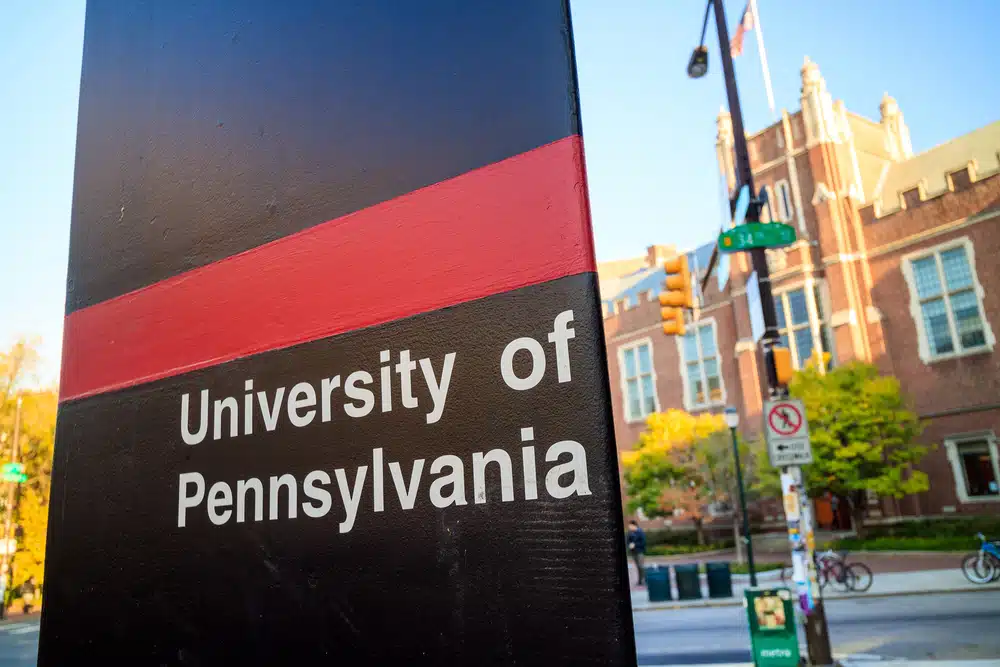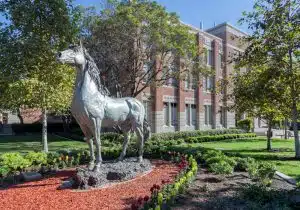UPenn vs Cornell: Which University is Right for You?
Choosing the right university is an important decision that requires careful consideration of various factors. Two prestigious universities that often compete for students are the University of Pennsylvania (UPenn) vs Cornell University. Both universities have a long history of academic excellence, research, and innovation, and are located in beautiful East Coast cities. In this article, we will compare UPenn and Cornell in different aspects to help you make an informed decision about which university is right for you.
Location and Campus Life: A Closer Look at UPenn and Cornell
UPenn and Cornell are both situated on the East Coast of the United States, but their locations and campus life are distinct. UPenn is located in the vibrant city of Philadelphia, a city that is known for its rich history, culture, and economic opportunities. The campus is spread across several neighborhoods and is easily accessible by public transportation. The campus has a mix of historic and modern buildings, and offers various social and cultural events for students.
Cornell, on the other hand, is located in Ithaca, a small town in upstate New York. The town is surrounded by nature and offers a peaceful and scenic environment for studying. The campus is situated on a hill overlooking Cayuga Lake, and is known for its stunning architecture and natural beauty. The college town offers a close-knit community feel, and has many restaurants and cafes that cater to the diverse population of students.
Despite their differences, both UPenn and Cornell offer a wide range of extracurricular activities for students to get involved in. UPenn has over 450 student organizations, including cultural clubs, sports teams, and academic groups. Cornell also has a diverse range of student organizations, with over 1,000 clubs and organizations to choose from. Both universities also have strong athletic programs, with UPenn being a member of the Ivy League and Cornell being a member of the NCAA Division I.
Academics: Programs, Majors, and Facilities at UPenn and Cornell
Both UPenn and Cornell are renowned for their academic programs and research facilities. UPenn offers over 90 majors across four undergraduate schools and is known for its programs in business, law, engineering, and medicine. The university also offers research opportunities through its centers and institutes, and has state-of-the-art facilities such as the Perelman School of Medicine and the Penn Museum.
Cornell, on the other hand, offers over 80 undergraduate majors across seven undergraduate colleges, with notable programs in agriculture, hospitality, and architecture. The university is also famous for its world-class research facilities, such as the Cornell Tech Campus and the Cornell NanoScale Science and Technology Facility, which allow students to gain hands-on experience in cutting-edge research.
Additionally, both UPenn and Cornell offer a wide range of graduate programs, including master’s and doctoral degrees. UPenn has graduate schools in fields such as education, social policy, and design, while Cornell offers graduate programs in areas such as business, law, and veterinary medicine. Both universities have a strong commitment to research and offer numerous opportunities for graduate students to engage in research projects and collaborate with faculty members.
Admission Requirements: What it Takes to Get into UPenn and Cornell
Getting into UPenn or Cornell requires a strong academic record, extracurricular activities, and personal characteristics. UPenn requires a competitive GPA, high SAT or ACT scores, and a well-written personal essay. The university also considers extracurricular activities, leadership potential, and community involvement.
Cornell, on the other hand, requires a strong academic record and involvement in extracurricular activities. The university also takes into account a student’s personality, interests, and background in the admissions process. The essay and interviews are crucial components of the application, and allow students to showcase their passions and goals.
It is important to note that both UPenn and Cornell have highly competitive admissions processes, with acceptance rates of around 8% and 11%, respectively. This means that applicants must not only meet the basic requirements, but also stand out among a pool of highly qualified candidates. It is recommended that students take challenging courses, participate in meaningful extracurricular activities, and seek out leadership opportunities to increase their chances of being admitted to these prestigious universities.
Cost of Attendance: Tuition, Room & Board, and Financial Aid Comparison between UPenn and Cornell
Attending UPenn or Cornell is expensive, and students are advised to plan their finances carefully. The cost of attendance at UPenn is around $78,000 per year, which includes tuition, fees, room and board, and other expenses. The university offers generous financial aid packages to eligible students, including grants, loans, and work-study programs.
Similarly, the cost of attendance at Cornell is around $75,000 per year, which covers tuition, fees, room and board, and other expenses. The university also offers various financial aid options, including need-based aid, merit-based scholarships, and work-study programs.
It is important to note that the cost of attendance may vary depending on the student’s individual circumstances, such as their residency status, program of study, and personal expenses. Additionally, both UPenn and Cornell have resources available to help students manage their finances, such as financial literacy workshops and counseling services. It is recommended that students research and compare the cost of attendance and financial aid options at both universities before making a decision on where to attend.
UPenn vs Cornell: Research Opportunities
Research is an integral part of the academic experience at UPenn and Cornell, and both universities offer numerous opportunities for students to engage in research. UPenn has 165 research centers and institutes, which cover a wide range of topics such as neuroscience, finance, and environmental studies. The university also offers research grants and fellowships to support innovative research projects.
Cornell is equally renowned for its research facilities, such as the Cornell Energy Systems Institute and the Cornell Center for Materials Research. The university also offers various research opportunities for students, such as the Undergraduate Research Program and the Cornell Presidential Research Scholars Program.
Moreover, both universities have state-of-the-art research facilities that provide students with access to cutting-edge technology and equipment. For instance, UPenn’s Singh Center for Nanotechnology is a world-class facility that offers advanced imaging and fabrication tools for nanoscale research. Similarly, Cornell’s Boyce Thompson Institute for Plant Research is a leading research center that focuses on plant science and genomics.
Additionally, both universities have a strong emphasis on interdisciplinary research, which allows students to collaborate with researchers from different fields and explore new areas of study. This approach fosters innovation and creativity, and prepares students for careers in a rapidly changing world.
UPenn vs Cornell: Student Organizations
Student organizations are a vital part of the college experience, and both UPenn and Cornell have a wide range of clubs and groups for students to join. UPenn has over 450 student organizations, including academic clubs, cultural groups, and sports teams. The university also has a thriving Greek life, with over 50 fraternities and sororities.
Cornell has over 1,000 student organizations, including academic clubs, cultural groups, and community service organizations. The university also has a strong Greek life culture, with over 70 fraternities and sororities. Additionally, Cornell offers various leadership development programs and opportunities for students to gain skills in areas such as public speaking and networking.
Both UPenn and Cornell also have a variety of student-run publications, including newspapers, magazines, and literary journals. These publications provide opportunities for students to develop their writing and editing skills, as well as to express their opinions and share their creative work with the campus community. Some of the most popular publications at UPenn include The Daily Pennsylvanian, 34th Street Magazine, and Penn Appétit, while Cornell’s most well-known publications include The Cornell Daily Sun, Kitsch Magazine, and Rainy Day Literary Magazine.
Alumni Network: Job Prospects and Career Services at UPenn vs. Cornell
Both UPenn and Cornell have a large and active alumni network, which provides valuable career resources and networking opportunities for students. UPenn alumni are known for their success in various fields, such as business, law, and politics. The university offers various career services, such as resume building and interview preparation, to help students navigate the job market.
Cornell alumni are equally renowned for their success in different fields, such as science, arts, and education. The university has a robust career center that offers career counseling, job search assistance, and recruiting events. Cornell also has a strong entrepreneurship ecosystem, which provides support and funding for innovative business ideas.
Aside from career services, UPenn also offers a wide range of internship opportunities for students to gain practical experience in their chosen fields. The university has partnerships with various companies and organizations, providing students with access to internships in industries such as finance, healthcare, and technology. UPenn also has a strong alumni mentorship program, where students can connect with alumni in their fields of interest for guidance and advice.
On the other hand, Cornell has a strong focus on research and innovation, with many of its alumni making significant contributions to their respective fields. The university has state-of-the-art research facilities and offers numerous research opportunities for students. Cornell also has a strong emphasis on sustainability and environmental conservation, with many of its alumni leading initiatives in these areas.
Athletics Programs: A Comparison of Sports Teams, Facilities, and Fan Culture at UPenn vs. Cornell
College sports are a popular activity for many students, and both UPenn and Cornell have strong athletics programs. UPenn has 33 varsity sports teams, which compete in the Ivy League conference. The university also has state-of-the-art athletic facilities, such as the Penn Park and the Palestra. The student fan culture is passionate and supportive, with many students attending games and cheering for their favorite teams.
Cornell has 36 varsity sports teams, which compete in the Ivy League conference. The university has impressive athletic facilities, such as the Lynah Rink and the Schoellkopf Field. The student fan culture is enthusiastic and loyal, with many students attending games and cheering for the Big Red teams.
Despite the similarities between the two universities, there are some notable differences in their athletics programs. For example, UPenn has a strong focus on rowing, with both men’s and women’s teams consistently ranking among the top in the country. Cornell, on the other hand, has a renowned men’s ice hockey team, which has won two national championships and has a dedicated following among students and alumni.
Another difference is the level of support for intramural sports. UPenn has a robust intramural program, with a wide range of sports and activities available for students to participate in. Cornell, while still offering intramural sports, does not have as extensive a program as UPenn. This may be due in part to the university’s focus on varsity athletics and the resources dedicated to those teams.
Campus Safety: Crime Rates and Security Measures on Campus at UPenn vs. Cornell
Campus safety is a priority for any university, and UPenn and Cornell take several measures to ensure a safe and secure campus. UPenn has a dedicated police force and security team, which patrol the campus and respond to any incidents. The university also offers various safety programs and resources, such as the Penn Guardian app and the Penn Violence Prevention program.
Cornell also has a strong campus safety culture, with a dedicated police department and safety team. The university offers various safety programs and resources, such as the Blue Light Escort Service and the Alertus Emergency Notification System.
Despite the efforts of both universities, there have been instances of crime on their respective campuses. According to the most recent data available, UPenn reported 28 incidents of rape, 16 incidents of robbery, and 47 incidents of burglary in 2019. In comparison, Cornell reported 14 incidents of rape, 10 incidents of robbery, and 56 incidents of burglary in the same year.
Both universities have taken steps to address these issues. UPenn has increased the number of security cameras on campus and implemented a new safety escort program. Cornell has increased the number of police officers on patrol and implemented a new bystander intervention program.
International Students: Support Services for International Students at UPenn vs. Cornell
International students face unique challenges when studying abroad, and both UPenn and Cornell offer various support services to ensure a smooth transition and a fulfilling experience. UPenn has a dedicated International Student and Scholar Services office, which provides assistance with immigration, housing, and cultural adjustment. The university also offers orientation programs and social events for international students.
Cornell has a similar infrastructure to support international students, including the Office of Global Learning and the International Students and Scholars Office. The university provides assistance with immigration, housing, and health insurance. Cornell also offers various cultural activities and events for international students, such as the Global Cornell Showcase and the International Food Festival.
However, there are some differences between the support services offered by UPenn and Cornell. UPenn has a language exchange program, which pairs international students with native English speakers for language practice and cultural exchange. Additionally, UPenn offers a Global Research and Internship Program, which provides international students with opportunities to gain professional experience in their field of study.
On the other hand, Cornell offers a program called International Peer Advisor Program, which connects international students with current Cornell students who can provide guidance and support. Cornell also has a program called International Friendship Program, which matches international students with local families for cultural exchange and social activities.
UPenn vs Cornell: Campus Tours & Open Houses
Visiting a university before applying is highly recommended, as it allows you to get a firsthand experience of the campus, the faculty, and the student life. UPenn and Cornell offer various campus tour options and open houses for prospective students. UPenn has daily campus tours, information sessions, and specialized tours such as the M&T Information Session for Engineering and Business, and the Kite and Key Campus Ambassadors Program.
Cornell also offers campus tours and open houses throughout the year, including information sessions, class visits, and student panels. The university also offers overnight visits for high school seniors, which provide an in-depth look at the campus and the academic programs.
In conclusion, choosing between UPenn and Cornell requires careful consideration of the various factors discussed above. Both universities have unique strengths and advantages and can offer an enriching and fulfilling college experience. We hope that this comparison has provided you with valuable insights that will help you make an informed decision about which university is right for you.
When visiting UPenn or Cornell, it’s important to also explore the surrounding areas. Both universities are located in small college towns, with UPenn situated in Philadelphia and Cornell in Ithaca. These towns offer a variety of cultural and recreational activities, such as museums, theaters, and outdoor adventures.
Additionally, it’s a good idea to talk to current students and faculty members during your visit. They can provide valuable insights into the academic programs, extracurricular activities, and overall student experience. You can also ask about research opportunities, internships, and career services.
How AdmissionSight Can Help You With College Admissions
AdmissionSight is a college consulting firm that provides personalized assistance to students throughout the college admissions process. Here are some ways that AdmissionSight can help you:
Admissions strategy: AdmissionSight can help you develop a strategic plan for your college application process. Our professional consultants can assist with identifying schools that are a good fit for your academic, extracurricular, and personal goals and help you plan and prioritize your application strategy.
Application review: AdmissionSight can review your application and provide feedback on how to improve it. We can offer suggestions on making your application stand out and highlighting your strengths and unique qualities.
Essay coaching: AdmissionSight can help you craft compelling essays that showcase your personality, goals, and achievements. We can guide you through the essay writing process and provide feedback on your drafts to help you refine your writing.
Interview preparation: AdmissionSight can provide interview coaching to help you feel confident and prepared for college interviews. Our experts can offer tips on how to present yourself professionally and how to answer common interview questions.
Extracurricular planning: AdmissionSight can help you plan and develop your extracurricular activities to make them more impactful and meaningful. We can suggest activities that align with your interests and goals and provide guidance on demonstrating your leadership and initiative.
Overall, AdmissionSight can provide valuable guidance and support throughout the college admissions process to help you maximize your chances of getting accepted into the college of your choice.
With a high success rate of over 75%, we have built a strong network in the past decade. Book an initial consultation today, free of charge!









































